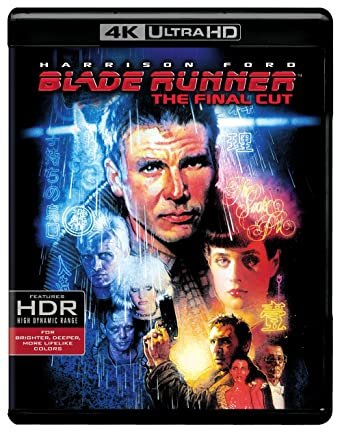Dish of the Day
Just some film musings of a more succinct, spontaneous and sometimes seditious nature:
Wednesday, May 10, 2023
In this series, I’ll briefly compare Director’s Cuts on various films to their Theatrical Releases. The general rule is: if the studio altered the film before it was released, then the Director’s Cut is the preferred version. If the director along with his editor originally took out scenes of his own volition, that were added back in later, chances are the Theatrical Cut is the better version to see. Some home video releases offer both or even multiple versions to choose from which of course is ideal.
(For Part 1: The Exorcist [The Director’s Cut] or The Exorcist [The Theatrical Release] in the series, click here).
Director’s Cut or Theatrical Release: which is better? Part 2 Blade Runner
Today, we will address Blade Runner (1982) which was reviewed here, with a brief comparison between the Theatrical Release in 1982 to The Director’s Cut released in 1992 and The Final Cut released in 2007.
Harrison Ford in Blade Runner
When a work print of Blade Runner was first shown at sneak previews in Dallas and Denver in 1982, the film scored poorly from test audiences which led to a studio imposed voice-over narration and happy ending being added. Judging a film’s appeal by asking a select audience what they would rather see, only reflects badly on those dumb enough to ask in the first place. The question turns the audience into filmmakers after the fact. It would be like a storyteller with a captive audience, after concluding the tale, asking what changes would make it better. How absurd is that?
The Theatrical Version’s most significant additions were:
1. An added narration provided for the central character not favoured by either the director nor the film’s star Harrison Ford. Ford stated he didn’t think it would be used, so gave this added voice-over no effort. Conceptually, adding narration to a film isn’t, in and of itself, a bad idea. Theoretically, a window into a loner-type character’s thoughts can help us identify with him and what he’s experiencing. One could have predicted, however, that since these changes were the result of a marketing ploy (no matter how many times test screenings have been used, they’re still a dumb idea) the results would be disastrous to the story’s integrity. A study of the words spoken reinforces that conclusion. * This added dialogue offers little to no understanding of either the thoughts or actions and are delivered in such an unappealingly dreary monotone, that instead of becoming film noir, this theatrical version turned out more like film null.
2. The added feel-good ending, namely, where Deckard and his replicant girlfriend ride off into the sunset with additional narration that makes everything look as artificially rosy as humanly possible.
The Director’s Cut wisely removed the intrusive narration, restored the ending whereby the main couple’s future is uncertain, and added a brief dream sequence involving a unicorn that gives a nice touch of ambiguity regarding Deckard and whether he too might be a replicant.
The Final Cut has made a number of technical improvements on The Director’s Cut that fix continuity and other visual problems, ultimately making the overall presentation more seamless. My only slight objection is a change made to a word of dialogue spoken by Rutger Hauer as replicant Roy Batty to his maker Tyrell played by Joe Turkel from “I want more life f**ker” to “I want more life father” which softens Batty’s character unrealistically, seeing as how important this goal is and even more so, how disappointing Tyrell’s response proves to be.
* Some of the more embarrassing examples of added narration include:
“Sushi, that’s what my ex-wife called me: cold fish.”
"I don't know why he let me live. Maybe in those last moments, he loved life more than he ever had. Not just his life. Anyone's life. My life."
“Gaff had been there, and let her live. Four years, he figured. He was wrong. Tyrell had told me Rachael was special. No termination date. I didn't know how long we had together... Who does?”
Verdict: Make it The Final Cut. This is the Director’s original vision most fully realised as well as providing a comparatively far more sophisticated and satisfying viewing experience.
Blade Runner The Final Cut is now available in 4k Ultra HD. Click on the image for more information including ordering from Amazon.com
All responses are not only welcomed but encouraged in the comments section below.
Hope to see you tomorrow.
A.G.

